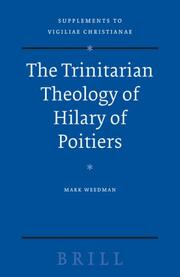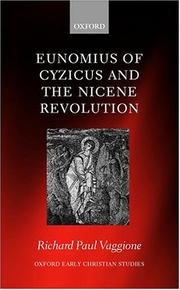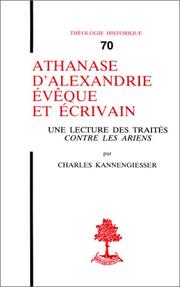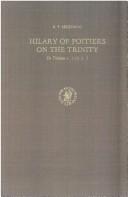| Listing 1 - 10 of 29 | << page >> |
Sort by
|

ISBN: 128193674X 9786611936747 9047431278 9789047431275 9789004162242 9004162240 Year: 2007 Publisher: Leiden ; Boston : Brill,
Abstract | Keywords | Export | Availability | Bookmark
 Loading...
Loading...Choose an application
- Reference Manager
- EndNote
- RefWorks (Direct export to RefWorks)
When Hilary of Poitiers was exiled from his native Poitiers in Gaul to Cappadocia, his entire theological sensibility changed. The Latin bishop, schooled in the tradition of Tertullian and Novatian, became a full-throated participant in the Trinitarian controversies of his time. This book offers a new reading of Hilary’s Trinitarian theology that takes into account the historical context of Hilary’s thought. It first examines this context and the course of Hilary’s engagement with his Homoian opponents. It then turns to the key themes of Hilary’s theology as he worked them out in that context. The result is a work that not only helps clarify Hilary’s theology, but that offers new insight into the Trinitarian controversies as a whole.
Trinity --- Homoousian controversy. --- History of doctrines --- Hilary,
Book
ISBN: 0232516928 Year: 1987 Publisher: London Darton
Abstract | Keywords | Export | Availability | Bookmark
 Loading...
Loading...Choose an application
- Reference Manager
- EndNote
- RefWorks (Direct export to RefWorks)
273.4 --- Arianism --- Antitrinitarianism --- Christian heresies --- Homoousian controversy --- Arianisme --- History --- Arius --- Arianism. --- Arius, --- 273.4 Arianisme --- Areios, --- Ario,

ISBN: 0198146787 9780198146780 Year: 2000 Publisher: Oxford: Oxford university press,
Abstract | Keywords | Export | Availability | Bookmark
 Loading...
Loading...Choose an application
- Reference Manager
- EndNote
- RefWorks (Direct export to RefWorks)
The study of 'Arianism' has proved one of the abiding fascinations and the abiding problems of early Christian studies in recent years. Here, Vaggione addresses the definition of the doctrine and why it generated such intense social turmoil by examining the standpoint of one of 'Arianism's' principal supporters, Eunomius of Cyzicus. Eunomius' life is used as a framework within which to discuss changes in the doctrine of the Trinity.
Arianism. --- Arianisme --- Eunomius, --- Arianism --- 273.4 --- Antitrinitarianism --- Christian heresies --- Homoousian controversy --- History --- Eunomius Bp. of Cyzicus --- 273.4 Arianisme --- Eunomio, --- Eunomios, --- Eunomius ep. Cyzicensis
Book
ISSN: 05534003 ISBN: 9783110251548 9783110251555 3110251558 1283400073 9786613400079 311025154X Year: 2011 Volume: 66 Publisher: Berlin ; New York : De Gruyter,
Abstract | Keywords | Export | Availability | Bookmark
 Loading...
Loading...Choose an application
- Reference Manager
- EndNote
- RefWorks (Direct export to RefWorks)
Während des sog. zweiten Reichs der Burgunder an der Rhône (etwa 443 bis zur Eroberung durch die Franken 534) entstand eine selbständige burgundische, "arianisch"-homöische Reichskirche. Das führte zu Auseinandersetzungen, aber auch zu einem intensiven theologischen Austausch mit der überwiegend nizänischen gallo-römischen Bevölkerung. Besonders das Werk des Bischofs Avitus von Vienne, seine reichhaltige Korrespondenz, theologischen Fragmente und Homilien geben einen unmittelbaren Einblick in die Zeit. Die Monographie führt in die Geschichte des Reichs der Burgunder ein und bietet erstmals ausgewählte Briefe und Fragmente des Avitus mit deutscher Übersetzung und Kommentierung. Im Mittelpunkt steht der theologische Austausch mit dem burgundischen König Gundobad. Die Briefe und Fragmente weisen auf kirchenorganisatorische Probleme hin - ob z.B. Kirchengebäude der "Arianer" genutzt werden können - sowie auf Religionsgespräche und theologische Diskussionen, besonders über den heiligen Geist (filioque). Es wird erstmals genauer beschrieben, was "arianisch" zu jener Zeit in Burgund bedeutete im Unterschied zu den gleichzeitigen theologischen Debatten im Reich der Vandalen.
Avitus, --- Burgundy (Kingdom) --- Homoousian controversy --- Church history --- 273.4 --- 27 <44> --- Arianisme --- Kerkgeschiedenis--Frankrijk --- 273.4 Arianisme --- Avitus, Alcimus Ecdicius, --- Avit, --- Alcimus Ecdicius Avitus, --- Bourgogne (Kingdom) --- Arles (Kingdom) --- Church history. --- Arianism --- Avitus ep. Viennensis --- Avitus, - Saint, Bishop of Vienne --- Burgundy (Kingdom) - Church history --- Homoousian controversy - Burgundy (Kingdom) --- Arian Controversy. --- Avitus of Vienne. --- Burgundian. --- Church History. --- Migration Period.
Book
ISBN: 9782503598093 2503598099 Year: 2022 Volume: 58/1 (253) Publisher: Sofia: Universitetsko izdatelstvo "Sv. Kliment Ohridski",
Abstract | Keywords | Export | Availability | Bookmark
 Loading...
Loading...Choose an application
- Reference Manager
- EndNote
- RefWorks (Direct export to RefWorks)
À la suite de PO 248 (56.3) qui présentait le Deuxième discours contre les ariens d’Athanase d’Alexandrie en version slavonne, ce fascicule offre pour la première fois une édition critique basée sur tous les témoins existants du Troisième discours avec traduction anglaise, le tout précédé par une introduction qui discute la relation entre les manuscrits, un cas spécial de la réception de textes grecs en Russie médiévale.
Arianism --- 276 =75 ATHANASIUS ALEXANDRINUS --- 276 =75 ATHANASIUS ALEXANDRINUS Griekse patrologie--ATHANASIUS ALEXANDRINUS --- 276 =75 ATHANASIUS ALEXANDRINUS Patrologie grecque--ATHANASIUS ALEXANDRINUS --- Griekse patrologie--ATHANASIUS ALEXANDRINUS --- Patrologie grecque--ATHANASIUS ALEXANDRINUS --- Antitrinitarianism --- Christian heresies --- Homoousian controversy --- History

ISBN: 2701010748 2701016843 9782701010748 Year: 1983 Volume: 70 Publisher: Paris: Beauchesne,
Abstract | Keywords | Export | Availability | Bookmark
 Loading...
Loading...Choose an application
- Reference Manager
- EndNote
- RefWorks (Direct export to RefWorks)
Arianism --- Controversial literature --- Athanasius, --- -Antitrinitarianism --- Christian heresies --- Homoousian controversy --- History --- Athanasius Saint, Patriarch of Alexandria --- Controversial literature. --- -Controversial literature --- Athanasius Saint, Patriarch of Alexandria. --- Antitrinitarianism --- Athanasius --- Arianism - Controversial literature --- Athanasius, - Saint, Patriarch of Alexandria, - -373 - Orations of S Athanasius against the Arians
Book
ISBN: 140944659X 9781409446590 1409446603 9781409446606 1409473287 9781409473282 9781315567891 9781317178644 9781317178651 Year: 2014 Publisher: Farnham: Ashgate,
Abstract | Keywords | Export | Availability | Bookmark
 Loading...
Loading...Choose an application
- Reference Manager
- EndNote
- RefWorks (Direct export to RefWorks)
Arianism --- Church history --- Arianisme --- Eglise --- History. --- Histoire --- History --- 273.4 --- Apostolic Church --- Christianity --- Church, Apostolic --- Early Christianity --- Early church --- Primitive and early church --- Primitive Christianity --- Fathers of the church --- Great Apostasy (Mormon doctrine) --- Antitrinitarianism --- Christian heresies --- Homoousian controversy --- Arianism. --- Primitive and early church. --- 30-600. --- 273.4 Arianisme --- Arianism - History --- Church history - Primitive and early church, ca. 30-600

ISBN: 9004067345 9789004067349 9004671676 9789004671676 Year: 1982 Volume: 6 Publisher: Leiden ;Boston Brill
Abstract | Keywords | Export | Availability | Bookmark
 Loading...
Loading...Choose an application
- Reference Manager
- EndNote
- RefWorks (Direct export to RefWorks)
Trinity --- Arianism --- Hilary, --- -Arianism --- -Antitrinitarianism --- Christian heresies --- Homoousian controversy --- Theology, Doctrinal --- Triads (Philosophy) --- Appropriation (Christian theology) --- God (Christianity) --- Godhead (Mormon theology) --- Holy Spirit --- Trinities --- Tritheism --- History of doctrines --- -History --- History --- Hilary Saint, Bishop of Poitiers --- -History of doctrines --- Trinity. --- Arianism. --- Antitrinitarianism --- Hilary, - Saint, Bishop of Poitiers, - -367? - De Trinitate
Book
ISBN: 9782503565804 2503565808 Year: 2017 Volume: 90B Publisher: Turnhout: Brepols,
Abstract | Keywords | Export | Availability | Bookmark
 Loading...
Loading...Choose an application
- Reference Manager
- EndNote
- RefWorks (Direct export to RefWorks)
Une édition remarquable pour la soigneuse analyse de la vaste tradition manuscrite et pour la nouvelle organisation du texte de Vigile qu'elle propose. Le 'Contra Arianos, Sabellianos, Photinianos dialogus' de Vigile de Tapse (PL 62) se présente comme un débat entre Athanase, Arius, Sabellius, Photinus et le juge Probus. Ce texte de la PL, qui est aussi le 'textus receptus' est précédé d'un autre texte, intitulé 'Contra Arianos dialogus', qui se présente comme une version courte du traité précédent. Cette double édition de Migne, habituellement dénommée version 'longue' et 'courte', reproduit celle publiée à Dijon en 1664 par J.-B. Chifflet. Les raisons données jusqu’à ce jour pour expliquer ce double état du texte se révèlent fausses ou incomplètes. La tradition manuscrite actuelle comporte 82 mss repérés. Tous ont été soigneusement examinés. La présente édition explique la double rédaction du 'Contra Arianos’, due à Vigile lui-même, et offre une vision d’ensemble de sa transmission très complexe. Elle propose une organisation du texte totalement nouvelle, mais scrupuleusement justifiée.
Vigilius, --- Criticism, Textual. --- Classical Latin literature --- Christian apologetics --- Arianism --- Sabellianism --- Christian heresies --- 276 "00/04" --- 276 "00/04" Patrologie. Patristiek--?"00/04" --- 276 "00/04" Patrologie. Patristique--?"00/04" --- Patrologie. Patristiek--?"00/04" --- Patrologie. Patristique--?"00/04" --- Heresies, Christian --- Heresies and heretics --- Heresy --- Theology, Doctrinal --- Christian sects --- Antitrinitarianism --- Homoousian controversy --- History --- Photinus, --- Photin,
Book
ISBN: 9782503585444 2503585442 Year: 2019 Volume: 56/3 (248) Publisher: Turnhout: Brepols,
Abstract | Keywords | Export | Availability | Bookmark
 Loading...
Loading...Choose an application
- Reference Manager
- EndNote
- RefWorks (Direct export to RefWorks)
"Oratio II contra Arianos is one of the three Orations that belong to Athanasius of Alexandria and represent his most famous theological work. Written originally in Greek between 339AD and 345AD and translated into Old Slavonic in 906AD by Constantine of Preslav, the Second Oration discusses the issue of Christ’s relation to God the Father and the controversial passages of Scripture in the context of the fourth-century Arian dispute. This critical edition is the first one to offer the Old Slavonic version of the Second Oration based on all existing manuscripts. It also provides a Greek text and English translation prefaced by an introduction on the origin, history, and text of Athanasius’ Orations in Slavonic." -- Academia page of Viacheslav Lytvynenko. "Le Deuxième discours contre les ariens d'Athanase d'Alexandrie a été traduit en slavon par Constantin de Preslav au début du Xe siècle. Cette édition critique présente le texte sur la base des dix manuscrits connus, avec traduction anglaise accompagnée de la recension grecque publiée dans Migne, PG 26. Une longue introduction discute divers points, comme la transmission du texte, la relation entre les manuscrits et la question de la Vorlage." -- Provided by publisher.
Arianism --- Antitrinitarianism --- Christian heresies --- Homoousian controversy --- History --- Athanasius, --- Afanasiĭ, --- Aḟanasīĭ Velikīĭ, --- Atanasio, --- Atanazy, --- Atanazy Wielki, --- Athanase, --- Athanasios, --- Athanāsiyūs, --- Athnāsiyūs, --- Bābā Athanāsiyūs Baṭriyark al-Iskandarīyah, --- أثناسيوس، --- بابا اثناسيوس بطريرك الإسكندرية --- Atanasie cel Mare, --- Pseudo-Athanasius --- Афанасий, --- Atanasije Aleksandrijski, --- Athanasios Alexandreias, --- Athanasius ep. Alexandrinus --- Athanasius
| Listing 1 - 10 of 29 | << page >> |
Sort by
|

 Search
Search Feedback
Feedback About UniCat
About UniCat  Help
Help News
News